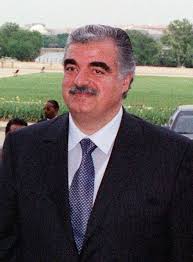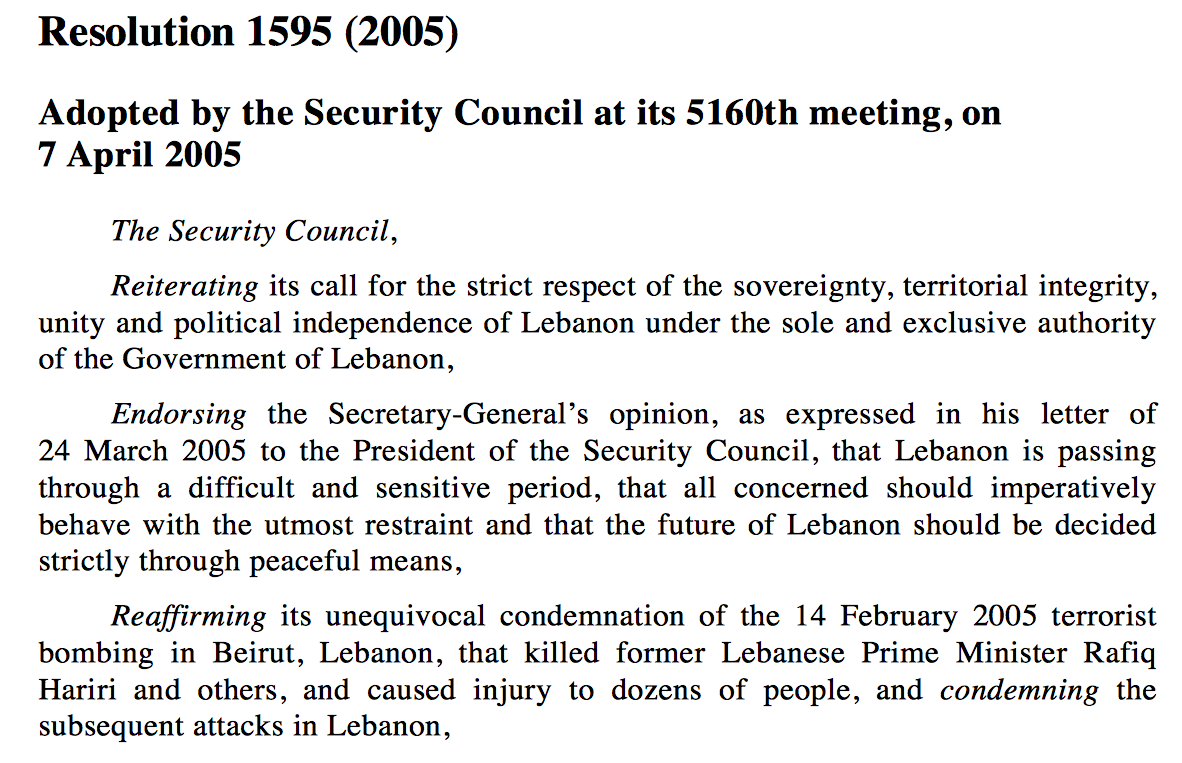The Hariri Assassination: Israel ’s Fingerprints
2010 Report Questioned the Legitimacy of the Special Tribunal for Lebanon (STL)

This incisive article by Rannie Amiri focussing on Israel’s spy ring in Lebanon was first published by Global Research on July 23, 2010. The article also addresses the role of the UN sponsored Special Tribunal for Lebanon (STL)
Is it relevant? According to the August 18, 2020 verdict by the Special Tribunal for Lebanon (STL) based in The Hague Salim Ayyash was found guilty of killing Prime Minister Rafik Hariri in a suicide car bombing on Feb. 14, 2005.
Cui bono? Lets review the timeline:
Two months after the assassination, on April 7, 2005 the United Nations Security Council unanimously adopted Resolution 1595 to form “an investigative team to look into Hariri’s assassination.”
The team’s report submitted to the UNSC in October 2005 pointed to the role of Syria’s military intelligence. The insidious role of Israel’s spy-ring operatives inside Lebanon was casually ignored despite the evidence.
This report serves Israel’s interests. It was released 8 months before Israel’s invasion of Lebanon in July 2006.
The following article of Rannie Ariri published ten years ago suggests that the verdict of the LST judgment should be questioned.
“Outside the obvious deleterious ramifications of high-ranking Lebanese military officers working for Israel, the very legitimacy of the Special Tribunal for Lebanon (STL) is now in question”. (2010 report entitled “The Hariri Assassination: Israel ’s Fingerprints”, below)
Flash Forward to August 2020
The Beirut explosion on August 4th, followed by the LTS’ “fake verdict” on August 18, have triggered destruction as well as political and social havoc within Lebanon.
According to (former) Israel Defense Forces Chief of Staff Gabi Ashkenazi (who currently serves as Israel’s Foreign Minister), in testimony to the Knesset [2010] revealed
“what Israel hopes the fallout from the STL’s report will be: fomentation of civil strife and discord among Lebanon ’s sectarian groups…” (Rannie Ariri, op cit).
And in recent developments, in the wake of the Beirut explosion, Foreign Minister Gabi Ashkenazi confirmed that Israel would channel medical humanitarian aid to Lebanon.
Michel Chossudovsky, Global Research, August 20, 2020
***
In the Middle East , the link between political machinations, espionage and assassination is either clear as day, or clear as mud.
As for the yet unsolved case of the February 2005 murder of Lebanese Prime Minister Rafiq Hariri, the underpinnings of this covert operation including the role of Israel have now surfaced.
A crackdown on Israeli spy rings operating in Lebanon has resulted in more than 70 arrests over the past 18 months. Included among them are four high-ranking Lebanese Army and General Security officers—one having spied for the Mossad since 1984.
A significant breakthrough in the ongoing investigation occurred in late June and culminated in the arrest of Charbel Qazzi, head of transmission and broadcasting at Alfa, one of Lebanon ’s two state-owned mobile service providers.
According to the Lebanese daily As-Safir, Qazzi confessed to installing computer programs and planting electronic chips in Alfa transmitters. These could then be used by Israeli intelligence to monitor communications, locate and target individuals for assassination, and potentially deploy viruses capable of erasing recorded information in the contact lines. Qazzi’s collaboration with Israel reportedly dates back 14 years.
On July 12, a second arrest at Alfa was made. Tarek al-Raba’a, an engineer and partner of Qazzi, was apprehended on charges of spying for Israel and compromising national security. A few days later, a third Alfa employee was similarly detained.
Israel has refused to comment on the arrests. Nevertheless, their apparent ability to have penetrated Lebanon ’s military and telecommunication sectors has rattled the country and urgently raised security concerns.
What does any of this have to do with the Hariri assassination?
Outside the obvious deleterious ramifications of high-ranking Lebanese military officers working for Israel, the very legitimacy of the Special Tribunal for Lebanon (STL) is now in question. The STL is the U.N.-sanctioned body tasked with prosecuting those responsible for the assassination of the late prime minister. On Feb. 14, 2005, 1,000 kg of explosives detonated near Hariri’s passing motorcade, killing him and 21 others.
It is believed the STL will issue indictments in the matter as early as September—relying heavily on phone recordings and mobile transmissions to do so.
According to the AFP,
“A preliminary report by the U.N. investigating team said it had collected data from mobile phone calls made the day of Hariri’s murder as evidence.”
The National likewise reported,
“The international inquiry, which could present indictments or findings as soon as September, according to unverified media reports, used extensive phone records to draw conclusions into a conspiracy to kill Hariri, widely blamed on Syria and its Lebanese allies …”
In a July 16 televised speech, Hezbollah Secretary-General Sayyid Hassan Nasrallah speculated the STL would use information gleaned from Israeli-compromised communications to falsely implicate the group in the prime minister’s murder:
“Some are counting in their analysis of the (STL) indictment on witnesses, some of whom turned out to be fake, and on the telecommunications networks which were infiltrated by spies who can change and manipulate data.
“Before the (2006) war, these spies gave important information to the Israeli enemy and based on this information, Israel bombed buildings, homes, factories and institutions. Many martyrs died and many others were wounded. These spies are partners in the killings, the crimes, the threats and the displacement.”
Nasrallah called the STL’s manipulation an “Israeli project” meant to “create an uproar in Lebanon .”
Indeed, in May 2008 Lebanon experienced a taste of this. At the height of an 18-month stalemate over the formation of a national unity government under then Prime Minister Fouad Siniora, his cabinet’s decision to unilaterally declare Hezbollah’s fixed-line communication system illegal pushed the country to the brink of civil war.
Recognizing the value their secure lines of communication had in combating the July 2006 Israeli invasion and suspecting that state-owned telecoms might be compromised, Hezbollah resisted Siniora’s plans to have its network dismantled. Their men swept through West Beirut and put a quick end to the government’s plan. Two years later, their suspicions appear to have been vindicated.
Opposition MP and Free Patriotic Movement head Michel Aoun has already warned Nasrallah that the STL will likely indict “uncontrolled” Hezbollah members to be followed by “… Lebanese-Lebanese and Lebanese-Palestinian tension, and by an Israeli war on Lebanon .”
Giving credence to Nasrallah and Aoun’s assertions, Commander in Chief of the Israel Defense Forces Gabi Ashkenazi, predicted “with lots of wishes” that the situation in Lebanon would deteriorate in September after the STL indicts Hezbollah for Hariri’s assassination.
Ashkenazi’s gleeful, prescient testimony to the Knesset’s Foreign Affairs Committee betrays what Israel hopes the fallout from the STL’s report will be: fomentation of civil strife and discord among Lebanon ’s sectarian groups, generally divided into pro- and anti-Syria factions. Ashkenazi anticipates this to happen, of course, because he knows Israel ’s unfettered access to critical phone records will have framed Hezbollah for the crime.
Israel’s agents and operatives in Lebanon and its infiltration of a telecom network have been exposed. At the very least, the STL must recognize that evidence of alleged Hezbollah involvement in Hariri’s death (a group that historically enjoyed good ties with the late premier) is wholly tainted and likely doctored.
The arrest of Qazzi and al-Raba’a in the breakup of Israeli spy rings should prompt the STL to shift its focus to the only regional player that has benefited from Hariri’s murder; one that will continue to do so if and when their designs to implicate Hezbollah are realized.
It is time to look at Tel Aviv.
Rannie Amiri is an independent Middle East commentator



